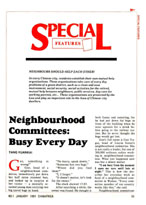NEIGHBOURS SHOULD HELP EACH OTHER!
In every Chinese city, residents establish their own mutual help organizations. These organizations take care of every day problems of a given district, such as a clean and save invironment, social security, social activities for the retired, mutual help between neighbours, public services, day-care for working parents, etc... These organizations are protected by the Law and play an important role in the lives of Chinese city dwellers.
Gao, something is wrong!”
Gao, head of a neighbourhood committee, immediately put down her half eaten steamed bun, and looked up in surprise at her visitor — a mentally retarded young man carrying two big travel bags in hand.
“No hurry, speak slowly.” “Someone lost two bags.” “Where did you find them?”
“I, I forgot.”
“It doesn’t matter, let’s look for the owner.”
The clock showed 13:03. After searching a while, the owner was found. He thought it both funny and annoying, for he had put down his bags in front of the building when he went upstairs for a drink before going to the railway station. But he never thought the bags would get lost.
Gao’s full name is Gao Yu-gui, head of Liuyin Street’s neighbourhood committee. She is not really a leader, but one of 360,000 ordinary cadres working in neighbourhood committees. What just happened now was but a minor matter.
“I am busy from the moment I open my eyes until late at night.” This is how she describes her everyday work as head of a neighbourhood committee in Wuhan. “Every committee member of our country works like this,” she said.
Neighbourhood committees can be in charge of 100 to 700 households. There are now 100,000 neighbourhood committees for 280 million city residents in China. Neighbourhood committees are self-administered mass organizations, basic organs among city residents in China. They consist of a leader and five to nine members selected by residents of the area. Most neighbourhood committee members are healthy, enthusiastic retired workers or housewives, aged 50 to 60.
To outsiders, cadres of neighbourhood committees are seniors occupying a good post and taking care of public order. Actually, this is just an aspect of their daily work, and most seniors are volunteers called on by the neighbourhood committee. All over the world, crimes are fought against. “Prevent any trouble” is the creed of neighbourhood committee cadres. When these cadres discover a criminal case, they at once intervene or report it to the police.
Part of their job is to maintain public security and take care of street health. In recent years, the scope of neighbourhood committees has expanded to almost every aspect of daily life. For example, neighbourhood committees promote the Constitution, laws and rules; protect the legitimate rights and interests of residents; organize mutual help groups; deal with public welfare and promote family planning; seek jobs for unemployed youth and ex-convicts; take care of lonely elderlies and disabled; mediate disputes between neighbours. In short, they exert every effort possible to improve the life and environment of residents.
The great efforts and enthusiasm of the cadres puzzle some people, including family members, because neighbourhood committee cadres get very little subsidy every month. Clearly, it is not money that motivates them to work so hard.
As a matter of fact, neighbourhood committee cadreslike and are satisfied with their way of life. Of course, devoting oneself to public service brings highly cherished and well deserved honours. When I took a picture of Gao Yugui, she insisted I photograph her in front of her merit certificates.
Due to various reasons, among them the low cultural level, some cadres just engross themselves in their work, without any care for the methods used, sometimes annoying residents or even making enemies.
“The neighbourhood committee did solve many practical problems for us,” stated a Tianjin resident who claims that “many people have the same feeling.”
This was also proven by the residents I interviewed. Evidently, theft decreased a lot because of the vigilance of neighbourhood committee cadres. Many people had happy-ending stories to tell me.
A middle-aged man living in Beijing’s Dashanlan Street told me: “I appreciate Yang shen (head of the local committee) very much. In the spring of 1977, I was looking for a job and went almost everyday to the neighbourhood committee to inquire about work possibilities. Yang showed deep concern for young people like me. Using her own money, she applied for a business licence in my name so that I could set up a tea stall in the street. At that time, just after the ‘cultural revolution,’ doing business was regarded as decadent. As a matter of fact, some people did censure Yang. This did not deter her and she kept on encouraging me to work hard and support myself with my own labour.”
A colleague of mine told me the story of a woman named Yan Huijuan living in Hangzhou. In 1981, there wasn’t a kindergarten in her area. Working couples could not take care of their children during the day and some parents had to bring them to a kindergarten far from their home or to relatives and pick them up after work. Moreover, some had to bring their children to work.
After Yan was elected head of the neighbourhood committee, she managed to persuade the relevant departments to solve the problem. Soon, funds were allocated for setting up a kindergarten. But the three rooms available were still not enough. Yan again proposed to expand the kindergarten, but to no avail. So she contacted directly the city’s mayor, and won his support. At the same time, residents were called upon to win the support of their leaders. As a result, many enterprises gave their help. The expanded kindergarten satisfied all the residents in the area.
Living in harmony is more precious than wealth. This phrase is the common wish of Chinese people, and it is the neighbourhood committee that make it a reality.
The main task of a neighbourhood committee is to organize neighbours in helping each other. In the mid 1980s, several “volunteers associations” appeared in Heping District of Tianjin (a large city in north China). These associations were organized by neighbourhood committees in an attempt to get neighbours to help each other.
Early in 1981, 50,000 young people in Harbin, a city in northeast China set up some 10,000 “close to the heart groups” to help lonely elderlies and disabled people. True to its name, the groups put some sunshine into the residents’ lives.
“Everyone cares about me, and I care about everyone; if someone has a problem, everyone lends a helping hand.” This is the motto guiding the mutual help movement of Nanxian Lane residents.
Assistance can take various forms among residents in Beijing’s Tianqiao area. For example, they have one-way services, two-way services, comprehensive services, set services, and centralized services(see article “Helpful Neighbours at Tianqiao”).
“The ladle clashes with the cooker.” This is the way elder-lies describe a family quarrel.
“Family quarrels are not dreadful, they can be solved by patching things up,” said a high-spirited senior citizen, head of a neighbourhood committee.
Since mediating mainly depends on one’s ability to communicate, many volunteers other than committee cadres have also participated in mediation. Their real purpose is to promote justice, truth and moral ethics.
Justice is very important. Inorder to convince people with powerful arguments and to do everything in accordance with the law, emphasis must be placed on communication. Patience is especially needed when two opposing parties firmly believe they are right.
“Mediating is an important aspect of Chinese civil lawsuit. Implementing it well can protect the legal rights and interests of the party concerned and maintain social stability. A good part of our work has been efficiently done by cadres of neighbourhood committees, easing our burden so that we could put more effort into serious cases,” said a lawyer.
Of course, mediation is not always as successful as one expects.
An anonymous neighbourhood committee head told me a story about her “unsuccessful” try.
A couple who never quarreled filed for divorce. The committee head went to mediate, but to no avail. Later, she could not accept the court’s decision to grant them a divorce. But the reason was very simple: on the surface they lived in harmony, but there was no love between them.
However, this head still held that it was possible to mediate and she exerted every effort to persuade them to get back together. She invited them over to dinner, and even bought clothes to the “husband,” pretending his “wife” had got them for him. She was very confident, believing they eventually would be reunited.
The mediator told them:“ I didn’t see my husband until my wedding day. But we have lived happily until today.” She still holds firm to her old beliefs.
China now is in a period of quick development. Everyday new things happen — new inventions, new habits, new notions. Some of them are accepted by older people while others are not as easily understood or accepted. Cadres of neighbourhood committees often meet this problem. For instance, in the eyes of elderlies, a married couple should remain devoted to each other till the end, even if they are not in love.
However, senior cadres of neighbourhood committees try and keep in step with the times.
A female leader told me: “It is more difficult to deal with the mass today because of changing notions. I asked my son, a college teacher, to give me some notions of psychology. For a qualified cadre, one has to have knowledge not only of policies and law of the state, but also of psychology. Since I hadn’t been to school before, I asked him to teach me in a simple language.”
One morning in a square, I noticed many people dancing disco. To my surprise, I realized many were seniors. Among them, there was an acquaintance of mine who is also head of a neighbourhood committee. She told me later: “Several years ago, I prohibited young people from dancing disco, regarding it as a decadent way of living. Now I realize disco is good for one’s health, and I myself am learning how to dance.”
There appeared in many Chinese cities “schools for the elderlies,” created by elderlies themselves. These schools offer many courses, such as calligraphy, painting, literature, cooking, and wushu. “One is never too old to learn,” said the head of a neighbourhood committee going to “school” every night.
I also had the honour of seeing a fashion show held by a neighbourhood committee and performed by elderly models. Their “fashion pace” kept us laughing all the time, but their conscientiousness was appreciated by all, and we were deeply touched by their enthusiasm.
Today, all over China, neighbourhood committees keep in step with life’s progress.
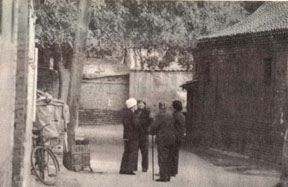
Neighbours have a friendly chat in the street. TANG YUANKAl
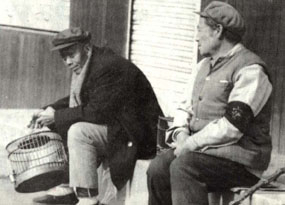
Retired workers keep away would-be thievies. TANG YUANKAl
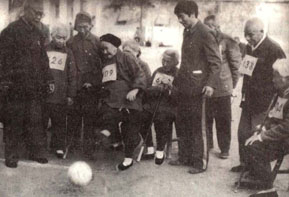
108 years old Wang Ronglan playing a game of “God of Longevity” organized by neighbourhood committee in Xinxiang, Henan Province. ZHONG HUA
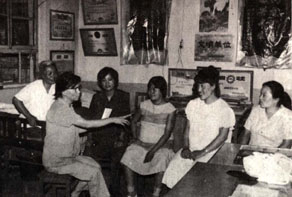
The head of Neighbourhood Committee stresses the importance and knowledge of eugenics to pregnant women. NIU WEI

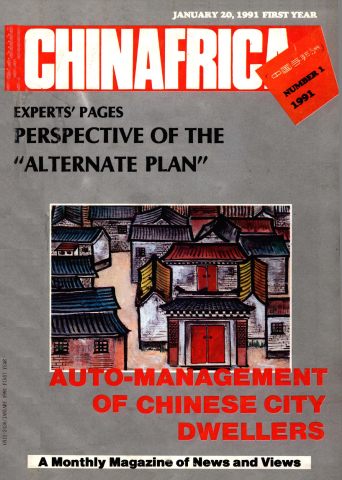
 Copy Reference
Copy Reference 